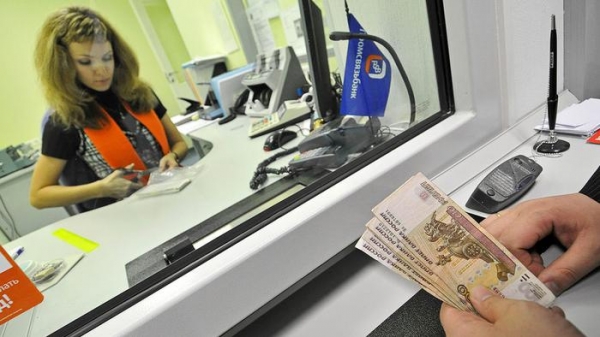
Rosfinmonitoring and the Central Bank has found a way to prevent unscrupulous customers who have already been denied service or operations.
Banks will soon get a new black list of clients with whom were terminated existing contracts for services and denied operations. These data banks will receive from the Central Bank, and the one from Rosfinmonitoring. Currently, the Central Bank and the fireside develop the appropriate regulations, the draft regulations are at the disposal of “Izvestia”. According to experts, the innovation will help to counter migration of suspicious customers to the largest banks, which intensified during the crisis.
Initially customer data-the”refuseniks” come in Rosfinmonitoring from the participants themselves finrynka — banks and non-Bank financial institutions (pension funds, insurance companies, brokers, pawnshops, microfinance organizations, management companies, etc.). Participants finrynka are reluctant to share such information with each other, and the lack of information exchange paves the way for abuse. At the same time, financial institutions report to Rosfinmonitoring about the facts of refusal of service under the current AML / CFT law (115-FZ). Now the fireside will promptly inform the Central Bank about all customers-the”refuseniks”. And the regulated organization in the first place — the banks.
The draft provisions state that information about which clients were denied services or who have been terminated the existing agreement, will include: information about the organization, which refused to the client in the transaction or terminated contract, the date of the decision of refusal, the information about the client. Message with these data will be protected using cryptography (special encryption).
The chief engineer of the design Institute of the Ministry of defence was accused of stealing 14 million rubles by the conclusion of fictitious contracts
Banks and non-Bank organizations have the right to refuse the client in conducting a transaction, a contract for services, and to terminate the existing agreement if the customer is suspicious by the AML / CFT law (there is a risk that he was involved in questionable conduct operations).
According to experts interviewed by “Izvestia”, the innovation will help the Rosfinmonitoring and the Central Bank in the fight against “migration” unscrupulous clients of banks.
“Despite the joint efforts of the Central Bank and Rosfinmonitoring, there is a migration of dishonest clients in the largest banks to “get lost” in extensive branch networks, large customer bases and transaction volumes, the report says Rosfinmonitoringa for 2015. — Last year, it was revealed 96 thousand cases of migration.
The report finesville also stated that banks refused to conclude contracts 142 million customers (an increase three times as compared to 2014). Refusal to conduct transactions received 94 thousand citizens (an increase of more than three times compared to 2014). Also in 2015, was terminated 2,3 thousand contracts of Bank accounts (growth more than doubled compared to the previous year).
Official representatives of the Central Bank and Rosfinmonitoring confirmed that the regulator, together with the fireside has been working to draft regulations defining the mechanism of bringing of information about failures customers.
According to the head of the financial monitoring service of the Bank Dina Bagataway, innovation, regulatory formulation and direction for all banks so-called black lists of customers who had any credit institution refused to open the account or in the payment, of course, is a radical and global prevention measure operations whose ultimate goal — money laundering and combating abusive clients.
— The aim of the novation is to prevent the adoption of their service to all the other credit organizations of the Russian Federation, — explains Dina Bagatov. But such measures, like a coin, has two sides. For banks such black list is to facilitate the work: it is not necessary to receive the service conduct a deep analysis of the client, study the documents and open sources of information, you already did a different credit organization and came to the conclusion that the client is unreliable; the Bank has to exercise its right of refusal of service also reduces the risk that the Bank fails to draw conclusions about the unreliability of the client and will be involved in questionable transactions.
On the other hand, no one is immune from mistakes.
In this black list of “refuseniks” can get a normal working a client who because of a biased assessment of its activities of one credit institution the way to the future existence will be closed due to the fact that no Bank no longer will accept it for service, — says the representative of the Bank.
According to the Deputy Chairman of the National Council of financial market Alexander Naumov, the reasons why the financial institution refused the client, the messages are not listed.
— The credit institution that received such information, cannot be sure that the reasons were significant, but given the risk the Bank will have to always refuse the client from the list of service — says the Chairman NSFR. — Any Bank shall have the right to challenge the admission of a client is unwanted. Perhaps this should be in the CBA or the financial monitoring Committee, which could act as arbitrators in this matter.
According to Alexander Naumov, the migration of “suspicious” customers, innovation is affected slightly.
— This norm is unlikely that anything will substantially change, although do not rule out that some time will complicate the activity of the customers recognized the “suspect,” — said the Chairman NSFR. — We have repeatedly observed, as persons engaged in illegal operations, change the scheme of their conduct.
Managing partner at audit company “2K” Tamara Kasyanova sure that the innovation will complicate the search of new banks to the shadow sector.
The head of Department of financial monitoring of Loko-Bank Igor Dremin believes that the list of refuseniks will be a very useful tool that will help preemptively refuse to doubtful clients at the stage of account opening.
— The big banks, for example, simply because of the value of its customer base can refuse customers for any formal triggers that are not conducting inspections, ” concludes Igor Dremin.








